According to a Sports Illustrated report from 2009, an estimated 60 percent of NBA players go broke within five years of retirement. Nearly a decade later, that number is still the same, and it leaves fans with so many questions.
How do you blow through tens, and sometimes, hundreds of millions of dollars? Have these guys ever heard of financial advisers? And why haven’t they learned from other players’ past mistakes?
Most “regular” people couldn’t blow through millions of dollars this quickly even if they tried to, but athletes aren’t regular people. They are used to a life filled with excess, whether it be from fame, fortune, women, or even drugs and alcohol. The latter three will be an underlying theme throughout this list as many players lost much of their wealth due to alimony or child support payments, while others battled addiction with addiction often prevailing.
These 30 NBA players who went broke aren’t just your end-of-the-bench G-League call-ups who squandered their money. These players combined to make 80 All-Star teams and nearly $2 billion in career earnings (and that doesn’t even count money from endorsements). The list includes five Hall of Famers and even one active player who went broke while still playing. Some of these guys were able to overcome their financial difficulties, or are at least in the process of doing so, while others just continued their downward spiral even without money in the bank.
Hopefully, the next generation learns from these NBA players who blew their millions.
#30: David Harrison
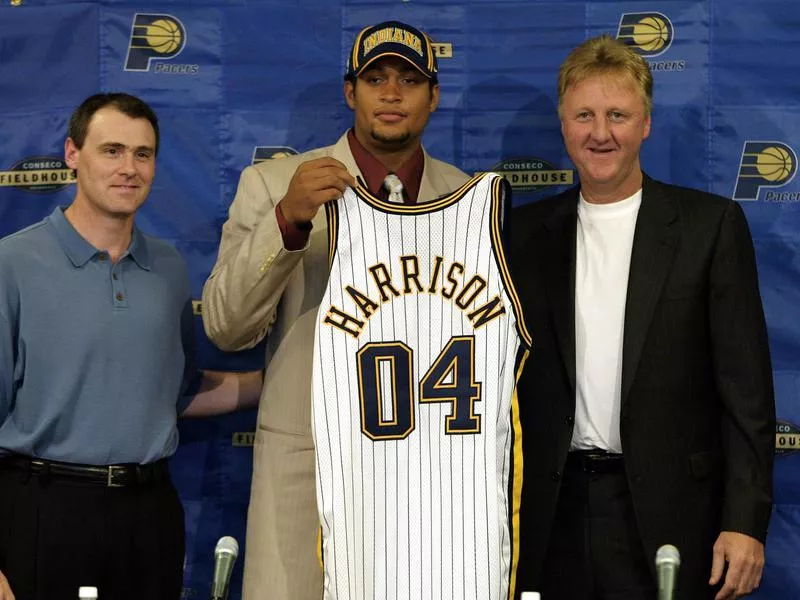
The Indiana Pacers drafted David Harrison, center, with the 29th pick in the 2004 NBA draft. Michael Conroy / AP Photo
In 2001, David Harrison was a McDonald’s All-American. A dozen years later, he was working at McDonald’s. In between, he played four NBA seasons with the Pacers and earned $4.4 million, but he lost 95 percent of it and took up the night shift at Mickey D’s.
“I was embarrassed because of where I could be in life,” Harrison told Yahoo Sports. “Everybody has to work and make a living somehow. I have two children. They don’t care where I work. They just need to eat.”
Fortunately, that was just a side job for Harrison, who quit after two weeks. He also made some income trading stocks and planned on returning to college to get his 16 credit hours needed to graduate, once he gathered enough money to do so.
#29: Latrell Sprewell
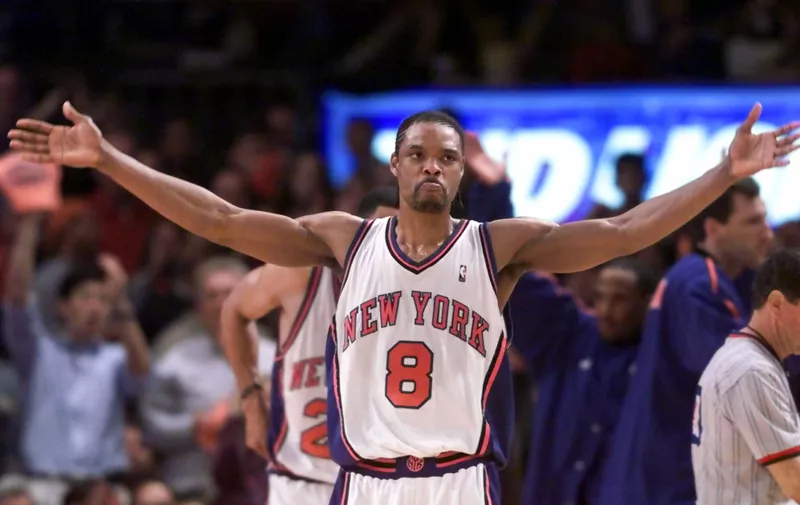
Latrell Sprewell tries to pump up the New York Knicks crowd during an NBA playoff game against the Miami Heat in 2000. Mark Lennihan / AP Photo
Latrell Sprewell turned down a $21 million contract extension with the Minnesota Timberwolves in 2004 because it wasn’t enough money.
“I got my family to feed,” Sprewell said.
That quote was the beginning of the end for the four-time All-Star. He never signed another NBA contract after the 2004-05 season and retired with $97 million in the bank.
However, just three years later, that money had dried up because his yacht was repossessed by federal marshals after he failed to continue to pay for it. Then months later, Sprewell defaulted on a $1.5 million mortgage, and his house went into foreclosure.
Sprewell still had the talent to play in the NBA at the time, but pride and ego got the best of him.
#27: Erick Strickland
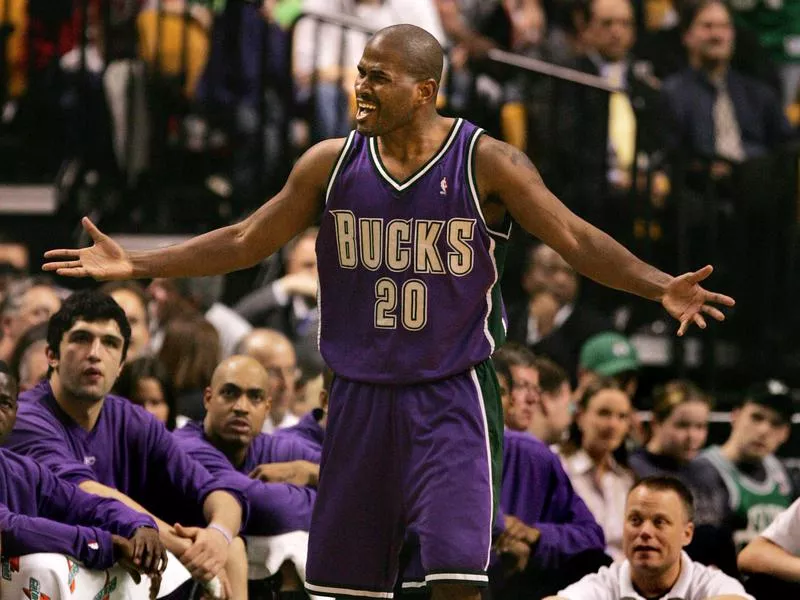
Milwaukee Bucks guard Erick Strickland questions a foul call during a game against the Boston Celtics in 2005. Charles Krupa / AP Photo
No one would ever confuse Erick Strickland with Rod Strickland since Erick had a journeyman nine-year career with six different teams. He made over $13 million in his career but went broke due to the advice of “a friend of a friend.”
Strickland was offered a real estate deal by that “friend” and had his father, who was also his business manager, check it out. It seemed like a good deal so Strickland bought it, but the land wasn’t worth anything close to what Strickland was told.
“I had to take that hit,” he says. “I wish my dad hadn’t been put in that position. He just didn’t have the knowledge.”
As for his “friend of a friend,” Strickland says the man secretly got a cut of the deal, which led to a falling out between the two.
#26: Larry Johnson
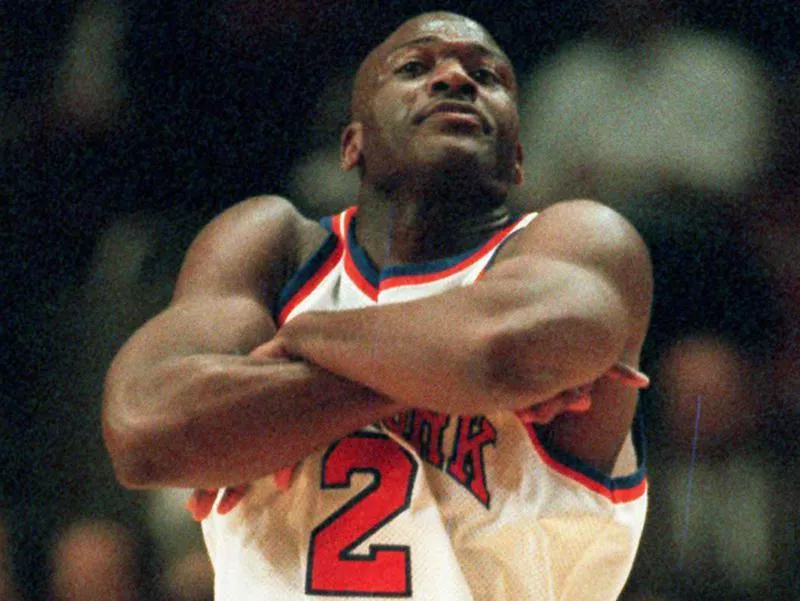
New York Knicks forward Larry Johnson plays to the Madison Square Garden crowd in a 1997 playoff game against his old team, the Charlotte Hornets. Bill Kostroun / AP Photo
The player nicknamed “Grandmama” had baby mama problems with five kids by four different women. The two-time All-Star made over $83 million in his career but filed for bankruptcy in 2015 due to owing child support.
He owed one woman $900,000, and LJ came up with a unique way to settle the debt: He offered her his house.
The home in Orange County, California, was worth over $800,000, and Johnson agreed to pay her $1,500 per month until the total amount was paid. The woman reportedly made the liquidation request that resulted in her getting the house because “some of the other baby mamas were getting more” than she was and she didn’t think it was fair.
#25: Eric Williams
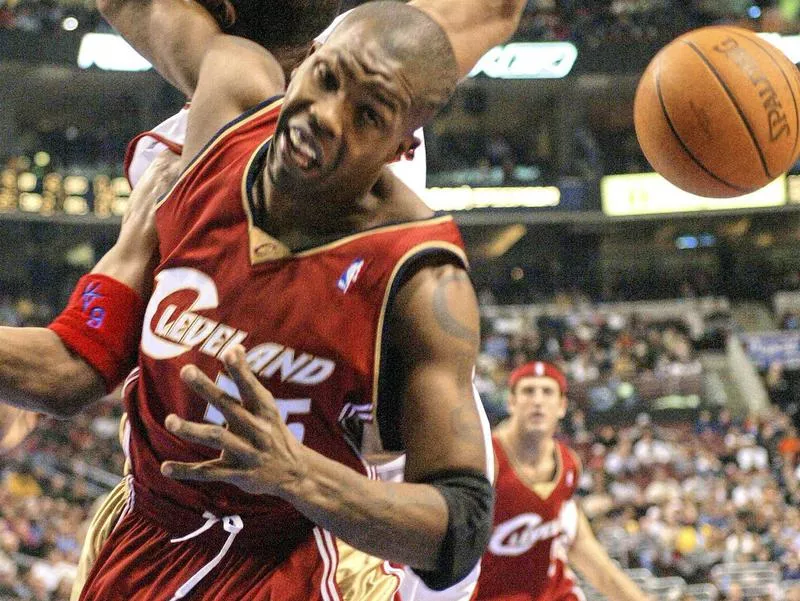
Cleveland Cavaliers forward Eric Williams during a 2003 game against the Philadelphia 76ers. George Widman / AP Photo
In 2004, Eric Williams was playing alongside a rookie LeBron James on the Cleveland Cavaliers. A decade later, the 12-year NBA veteran who made nearly $40 million was homeless.
Legal documents acquired by TMZ Sports showed that a court-ordered citation could not be delivered to Williams’ home address because he had no home. The citation was in reference to Williams being $24,000 behind in child support to a woman in Colorado.
Williams also said in the docs that he couldn’t afford an attorney or airfare to get to Colorado and that he had been working as a volunteer at a nonprofit organization.
Williams rebounded somewhat, or at the very least received a nice paycheck, as he was featured in a 2015 critically acclaimed painting that was based on “Freedom from Fear” by Norman Rockwell.
#24: Sheryl Swoopes
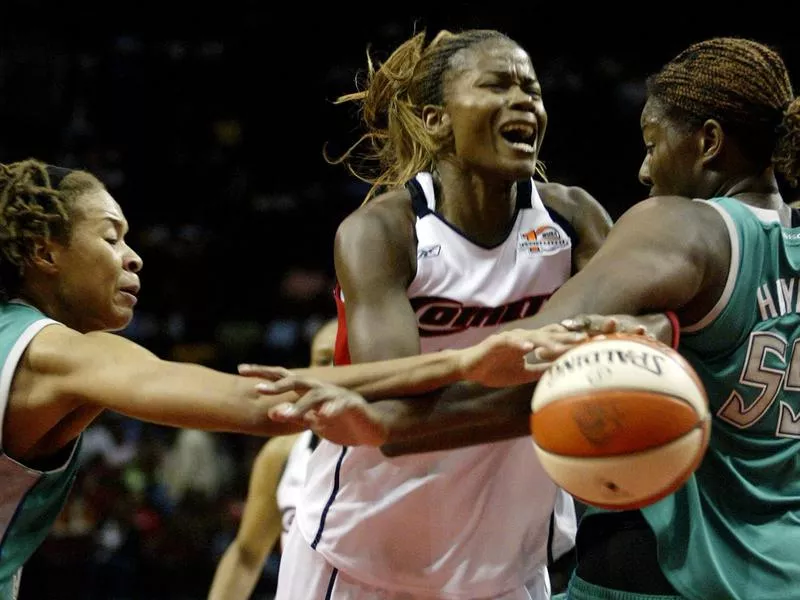
Houston Comets star Sheryl Swoopes, center, is double-teamed by Minnesota Lynx defenders during a WNBA game in 2006. Jessica Kourkounis / AP Photo
We’re cheating a bit here since Sheryl Swoopes played in the WNBA, not the NBA. But when your nickname is “The Female Michael Jordan,” there’s a good chance you could have beaten some NBA players in a game of one-on-one.
WNBA salaries are nowhere near the male counterparts, but thanks to Swoopes becoming the first women’s basketball player to have a Nike shoe named after her, she made over $50 million in salary and endorsements.
She also apparently blew that amount, since she filed for bankruptcy in 2004 during the middle of her WNBA career. Swoopes was so broke that she couldn’t even afford the $300 monthly payments to a storage unit, and as a result, she lost many prized possessions that were kept there.
At 39, one of the greatest women’s players of all time was forced to play overseas in Greece to earn a paycheck.
She eventually returned to the WNBA for one last season at 40 and now is an assistant coach at Texas Tech, her alma mater.
#23: Randy Brown
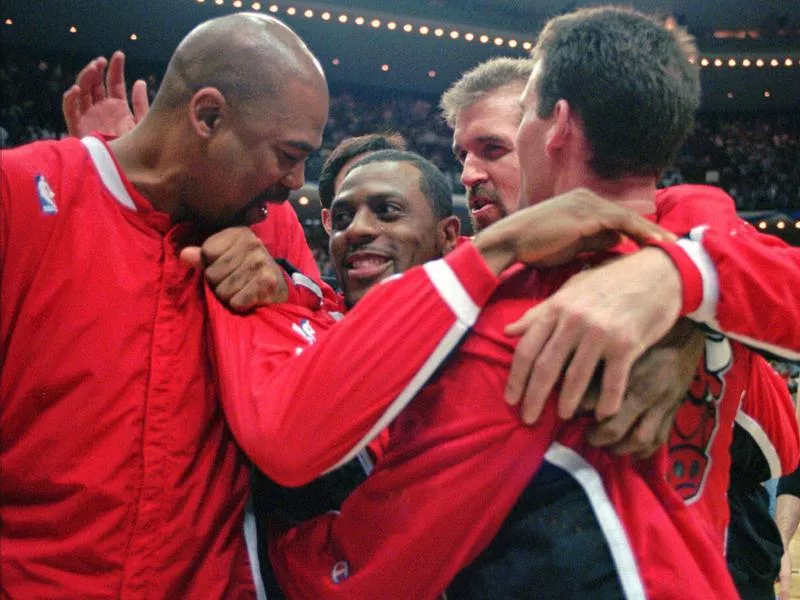
Randy Brown, center, celebrates with Chicago Bulls teammates after the Bulls eliminated the Orlando Magic to advance to the NBA Finals in 1996. Steve Simoneau / AP Photo
Fans of the Jordan-era Chicago Bulls are familiar with Randy Brown, who was a defensive specialist that could smother opposing point guards for the full 94 feet.
But roughly five years after his playing career ended, Brown had squandered the $15 million he made during his career on a string of poor business decisions in real estate and restaurants.
“It was humbling,” Brown said of going bankrupt. “When I retired from basketball, I became my own business person with all these people I thought were my friends. What set me back was when I signed my name to a bunch of stuff that I shouldn’t have.”
Shortly afterward, Brown lost his job as an assistant coach with the Sacramento Kings, but the franchise he won three NBA championships with in the 1990s came in to save the day. The Bulls hired Brown as their director of player development, and he eventually got promoted to assistant general manager.
#22: Charles Barkley
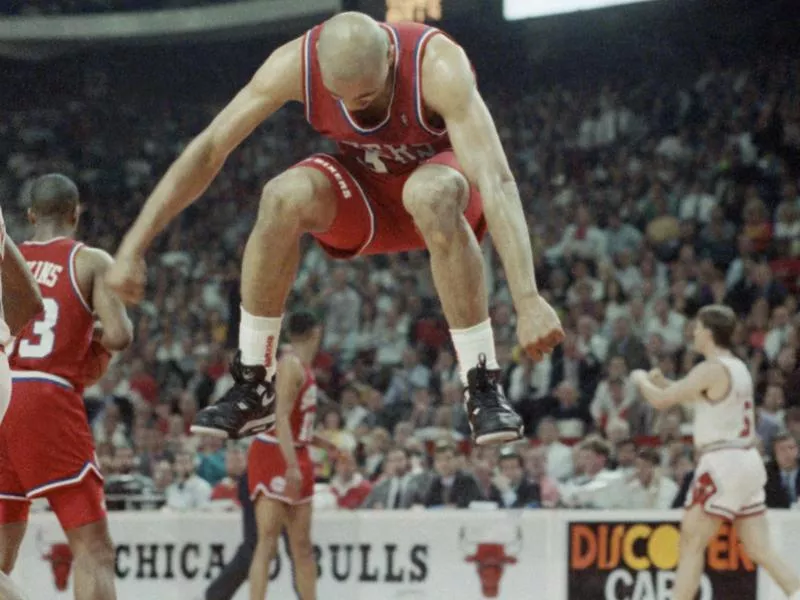
Charles Barkley shows his disgust after being called for a foul during a Philadelphia 76ers’ playoff game against the Chicago Bulls in 1990. Jonathan Kirn / AP Photo
Nearly everyone on this list lost money due to bad investments, child support or a lavish lifestyle. However, “Sir Charles” lost nearly $30 million at the roulette table and slots machine.
Charles Barkley says he didn’t lose all the money in one sitting — he lost $1 million on 30 separate occasions.
Barkley claims he has won millions of dollars at casinos, but losing happens three times as much as winning occurs for “The Chuckster.” Barkley does not believe he is a gambling addict and says he has learned to do things in moderation after taking a two-year break from gambling.
He adds that he’s fine with stopping when he loses $200,000 and still can enjoy himself. That’s something we all should aspire to doing.
#21: Jason Caffey
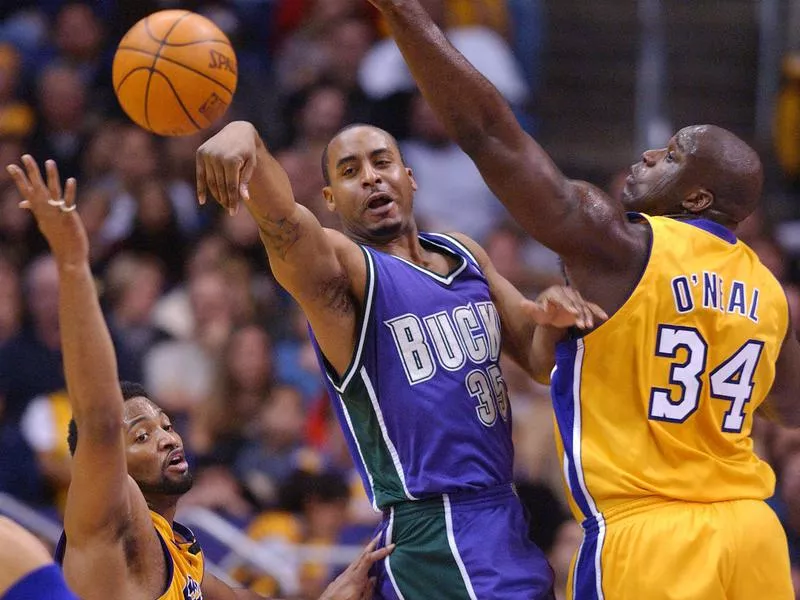
Milwaukee Bucks forward Jason Caffey, center, passes the ball in a 2002 game against the Los Angeles Lakers. Lucy Nicholson / AP Photo
A recurring theme on this list is that many former NBA players reached dire financial straits due to owing child support. With (at least) 10 children from (at least) eight different women, yeah, Jason Caffey, you are part of that group.
Caffey was Dennis Rodman’s backup during the second Bulls three-peat of the 1990s and made over $34 million during his career. After his career was over, Caffey was arrested for not paying child support. A judge dismissed his bankruptcy case because that would have opened the door for the eight mothers of his 10 children to sue him for child support.
“It’s never that I didn’t send child support,” Caffey said, when asked about his failures to pay child support. “It’s just that I didn’t send the amount that was said to be sent by the courts.”
#20: Glen Rice
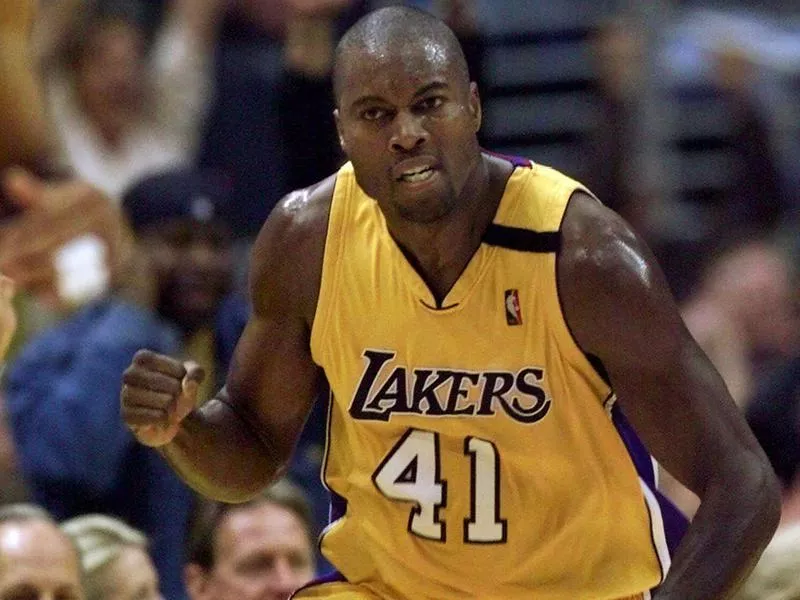
Glen Rice after sinking a 3-pointer for the Los Angeles Lakers against the Phoenix Suns during a playoff game in 2000. Kevork Djansezian / AP Photo
Nicknamed “G-Money” during his NBA career, Glen Rice was then called just “G” after retiring because he had no money.
That became evident in a paternity suit filed against the three-time All-Star in which Rice, who made over $68 million in his career, asked a judge to reduce his monthly child support payments from $1,500 to $600.
Court papers said that Rice “has attempted to become gainfully employed in various capacities but has been unable to earn a semblance of meaningful income.”
The little income that Rice was receiving came from profiting off his own likeness via memorabilia signings and appearances. However, that amount wasn’t enough for his child support payments, and a judge agreed to allow Rice to pay the lower monthly payments.
#19: Dennis Rodman
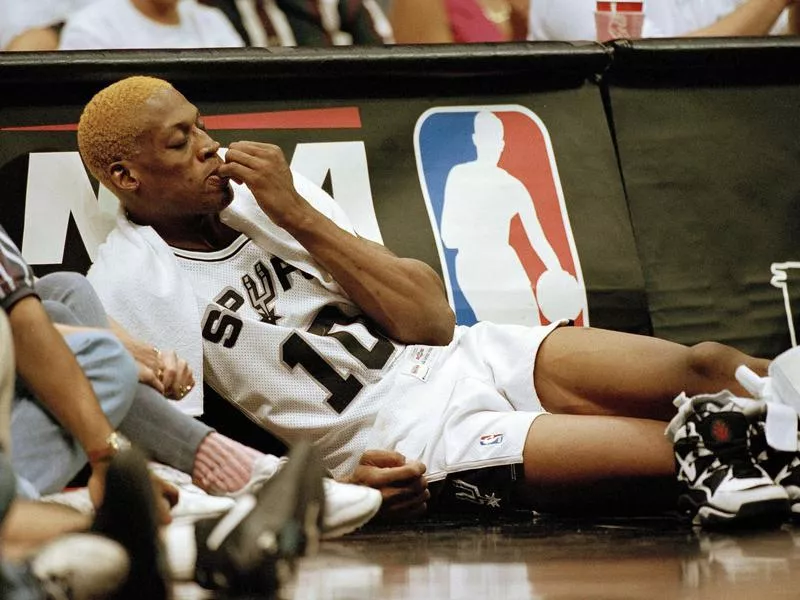
Dennis Rodman rests on the sidelines during a San Antonio Spurs playoff game against the Houston Rockets in 1995. David J. Phillip / AP Photo
Between his several trips to North Korea, “The Worm” had several trips to the local courthouse to deal with child support and/or alimony payments.
Dennis Rodman was unable to keep up with his own living expenses for his lifestyle, and his third wife said he owed over $800,000 in back child support and another $50,000 in back spousal support. His lawyers, who worked pro bono, described the five-time NBA champion as “broke” and “extremely sick,” and shortly thereafter, he entered rehab for alcohol abuse.
When Rodman was inducted into the Hall of Fame, he said, “I didn’t play the game for the money.” That’s an honorable statement, but perhaps he should have bargained for more money during his career as he needed it later in life.
Or perhaps he just should have not been as reckless with the $26 million-plus he made in his career.
#18: Dan Issel
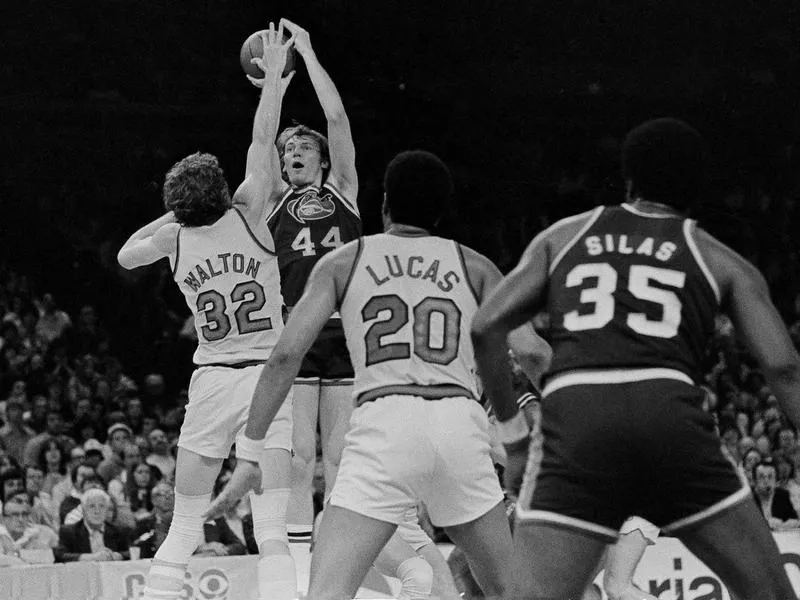
Dan Issel shoots the ball for the Denver Nuggets during a 1977 playoff game against the Portland Trail Blazers. Jack Smith / AP Photo
A seven-time All-Star, Dan Issel made the Pro Basketball Hall of Fame on the strength of his play in the ABA, where six of his All-Star appearances came. He later became a coach and executive for the Denver Nuggets but also had several business dealings outside of basketball.
Those business dealings weren’t as successful as his playing career, and Issel went bankrupt in 2009, saying he owed $4.5 million to 34 creditors.
“It was terribly embarrassing,” said Issel. “:People had confidence in my ability as a businessman. That’s why they loaned me the money in the first place. But it’s not like I gambled my money away. I’m not addicted to drugs. It was bad luck and bad timing and bad decisions.”
To help get him out of debt, Issel had to auction off several prized possessions, including his 25th anniversary ABA All-Star ring and his lone NBA All-Star ring.
#17: Clifford Robinson
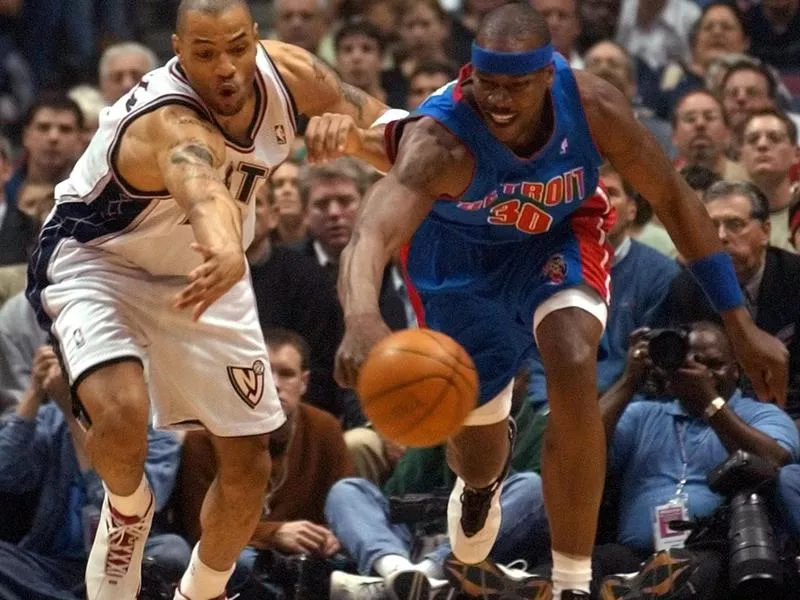
Detroit Pistons forward Clifford Robinson, right, battles for a loose ball with Kenyon Martin during a playoff game in 2003. Bill Kostroun / AP Photo
Clifford Robinson played forever in the NBA and didn’t retire until he was 40 years old. Shortly after his retirement, we learned why he stayed around so long — he needed the money.
Robinson made over $61 million in his 18-year career that ended in 2007, and just two years later, he declared bankruptcy. A filing listed his assets at $7.1 million and his liabilities at $12.4 million for a net worth of -$5.3 million.
Fortunately, Robinson, who was nicknamed “Uncle Cliffy,” was able to land on his feet thanks to a thriving cannabis line called “Uncle Spliffy.”
Robinson also was fortunate to spend most of his career with the Portland Trail Blazers since the state of Oregon became the first state to legalize cannabis for medical purposes, and that’s where Robinson first launched his line of products.
#16: Scottie Pippen
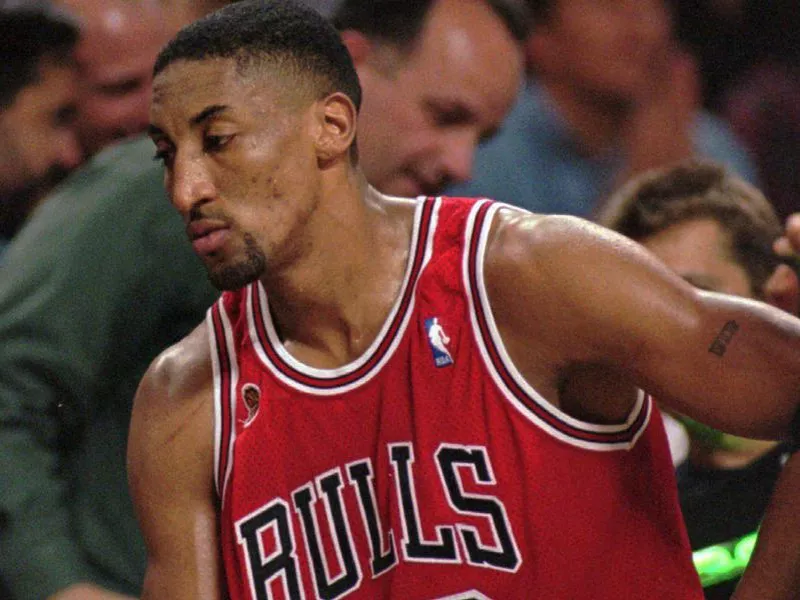
A dejected Chicago Bulls Scottie Pippen sits on the bench during a 1996 NBA Finals game against the Seattle SuperSonics. Seattle won the game, but Chicago won the series. Beth A. Keiser / AP Photo
You can never say that Scottie Pippen was reckless with his money — waiters in Chicago gave him the nickname of “No Tippin’ Pippen.”
But the most famous Robin in NBA history was defrauded out of millions by a financial adviser. An adviser that was recommended to Pippen by the Bulls committed various kinds of fraud with the $20 million that Pippen invested, including forging the Hall of Famer’s signature on a $1.4 million loan.
That adviser was sentenced to three years in prison, and Pippen, who made over $109 million in NBA salary, received just $400,000 in restitution from his former adviser.
#15: Ray Williams
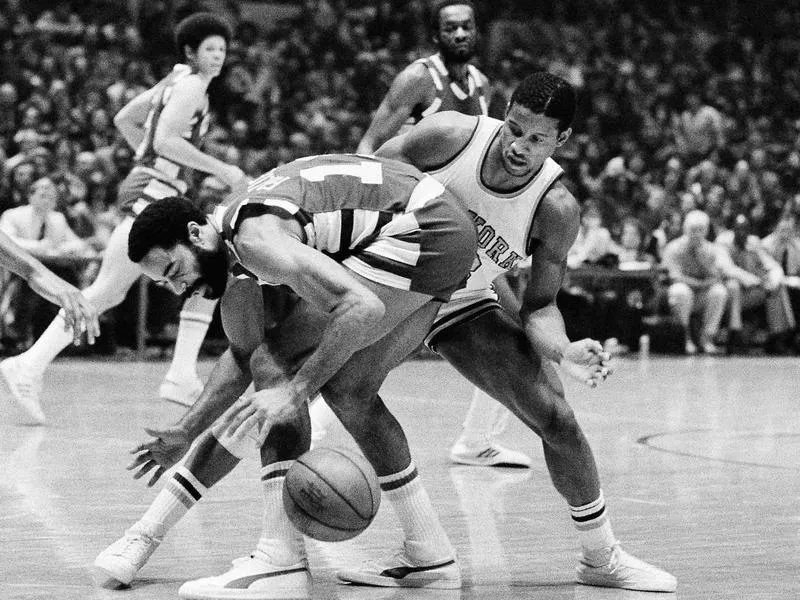
New York Knicks guard Ray Williams, right, battles Cleveland Cavaliers guard Walt Frazier for the ball during a 1977 game at Madison Square Garden. AP Photo
Once the toast of New York and electrifying Madison Square Garden, Ray Williams was homeless and sleeping in a broken-down Buick after his career ended.
Retired in 1987 with $2.5 million in career earnings, Williams struggled financially and went bankrupt. He applied for, and received, his NBA pension early but lost that $200,000 to a real estate scam in Florida.
Down and out, The Boston Globe wrote a story on Williams’ struggles in 2011. Williams played for the Celtics in the mid-1980s, and upon hearing about his plight and that he was living out of his car parked in front of a friend’s house, help began pouring in. Celtics legends Larry Bird and Kevin McHale got into contact with their former teammate to help him get back on his feet. He was able to secure a job in his hometown of Mount Vernon, N.Y., as a recreation specialist.
Williams passed away from colon cancer in 2013 at the age of 58.
#14: Sidney Moncrief
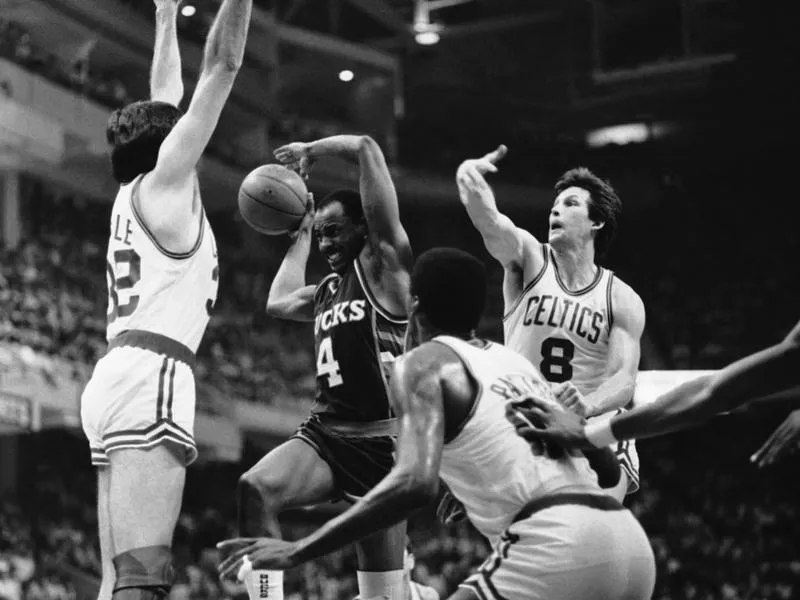
Milwaukee Bucks guard Sidney Moncrief finds himself surrounded by Boston Celtics in a 1986 NBA playoff game at the Boston Garden. David M. Tenenbaum / AP Photo
Nicknamed “Sid the Squid,” Sidney Moncrief was one of the best guards of the 1980s. He made five straight All-Star teams with the Milwaukee Bucks and is the only guard in NBA history to win two Defensive Player of the Year awards.
He retired before NBA contracts became multimillion dollar deals in the 1990s, but The Squid still overspent the estimated $7 million he did make shortly after he hung up his sneakers.
Despite opening a car dealership in his native Arkansas and serving as an assistant coach with the Dallas Mavericks, Moncrief filed for bankruptcy in 2005. Among his creditors were the Mavs, numerous car dealerships, a bank and The Oklahoman newspaper.
Moncrief was able to rebound his way out of debt and later became a G-League coach and analyst for Fox Sports.
#13: Rick Mahorn
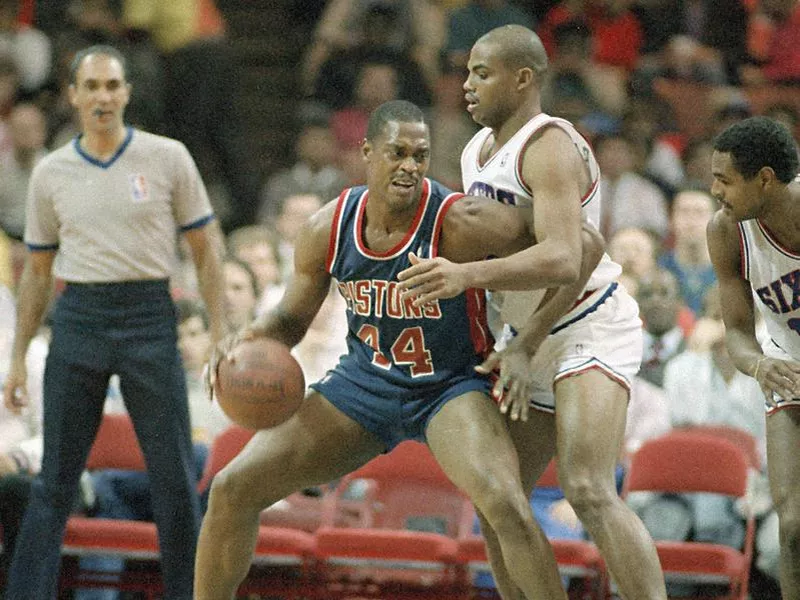
Detroit Pistons Rick Mahorn, left, throws an elbow as he rolls to the hoop around Philadelphia 76ers forward Charles Barkley during 1987 NBA action at the Spectrum in Philadelphia. Charles Krupa / AP Photo
Rick Mahorn was a starter on the “Bad Boys” Detroit Pistons of the late 1980s and enjoyed an 18-year NBA career in which he played until he was 40. However, much of that career came before the salary cap exploded, and as a result, Mahorn made about $10 million, which is a nice chunk of change, but less than what many current players make in a single season.
A decade after retiring in 1999, Mahorn defaulted on his mortgage, owed the IRS more than $200,000 and was forced to file for Chapter 7 bankruptcy. That came despite having a six-figure salary as a WNBA coach and receiving his NBA pension.
Just as the game of basketball brought Mahorn his wealth, it also brought him out of debt as he landed a job as a broadcaster with the Pistons and then another job as a coach in the Big3 league.
#12: J.R. Smith
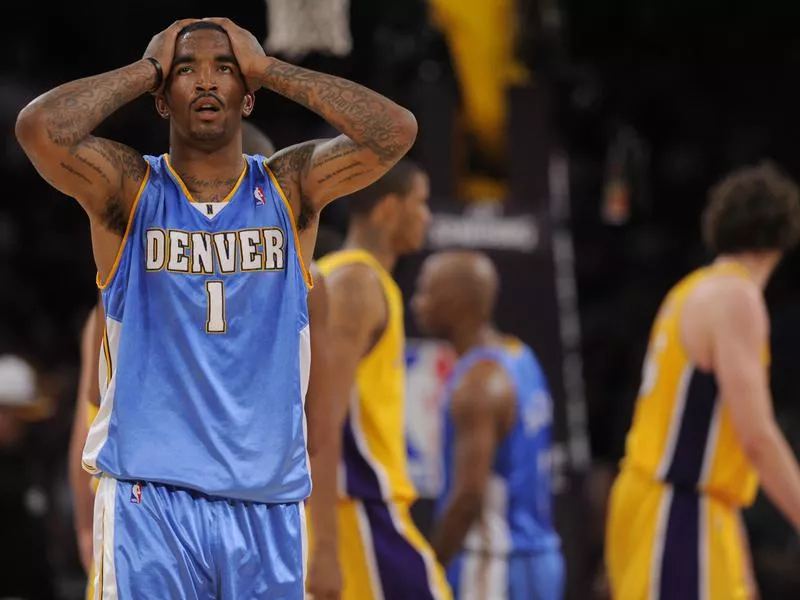
Denver Nuggets guard J.R. Smith during the final moments of a loss to the Los Angeles Lakers in a 2009 Western Conference finals playoff game in Los Angeles. Chris Carlson / AP Photo
Everyone’s favorite knucklehead has the unenviable honor of being the only person on this list who is still an active player. Smith isn’t broke at the moment, as he’s in the middle of a $57 million deal with the Cleveland Cavaliers, but he did go broke in 2012, his eighth year in the NBA.
Smith went to China during the 2011 NBA lockout because he was running low on funds, and when he came back to the States, he was broke, according to ESPN. Smith signed a contract in early 2012 with the Knicks because they offered the most money as he had blown through the $23 million he had made up to that point.
By the time Smith’s current contract expires in 2020, he will have made over $102 million in salary, but with his inglorious history, it wouldn’t be a surprise if he becomes the first NBA player to go broke twice.
#11: Mookie Blaylock
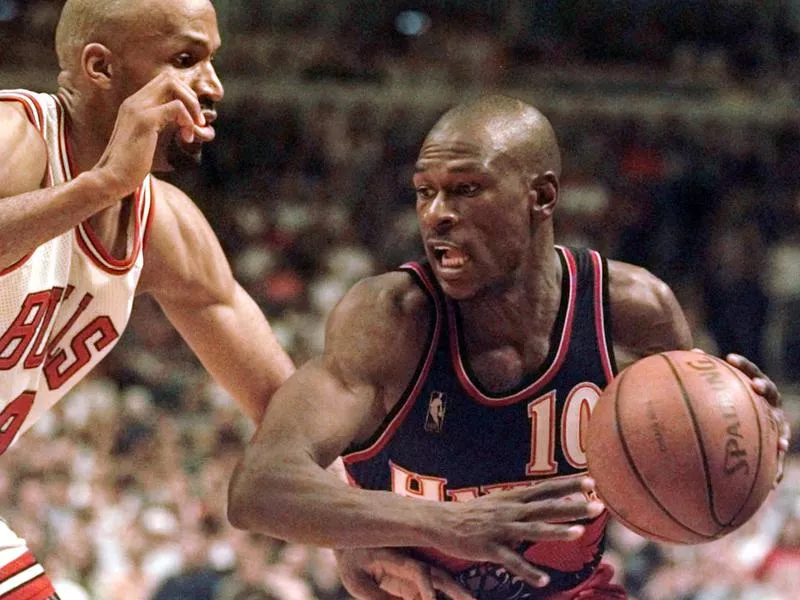
Atlanta Hawks guard Mookie Blaylock, right, drives against the Chicago Bulls’ Ron Harper during a 1997 NBA playoff game in Chicago. Michael S. Green / AP Photo
Mookie Blaylock was a defensive-first point guard who became the third player ever to lead the NBA in steals in consecutive seasons. But while he could protect the defensive end of the court, he couldn’t protect the $32 million he made in his career and had to resort to bartending in retirement.
But Blaylock’s issues go beyond financial woes as he became a full-blown alcoholic after his playing days were done. He had no fewer than seven DUIs, including one where his blood alcohol content was four-and-a-half times the legal limit.
While it would be nice if Blaylock made a complete 180 and turned his life around, unfortunately, that is not the case. In 2014, while driving on a suspended license, Blaylock was involved in a head-on collision that killed a mother of five. He was sentenced to seven years in prison followed by eight years of probation.
#10: Christian Laettner
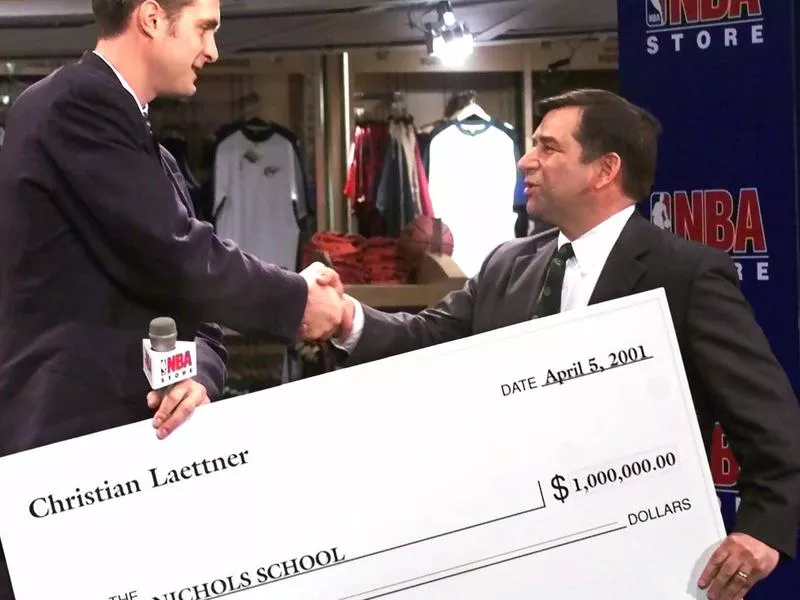
Washington Wizards forward Christian Laettner, left, presents a $1 million donation to Richard C. Bryan Jr., the headmaster of The Nichols School in Buffalo, N.Y., during a New York news conference in 2001. The donation to Laettner’s high school alma mater was used to help build a new gymnasium and to establish a scholarship fund. Ed Bailey / AP Photo
Many hate Christian Laettner, but he may have played in the greatest college basketball game of all time and been a part of the greatest basketball team of all time.
Laettner had a journeyman NBA career but racked up over $61 million during 13 seasons. Yet in 2016, a group of creditors filed bankruptcy proceedings against him and said he owed over $14 million after a string of bad business deals regarding real estate in North Carolina.
Around the same time that happened, TMZ reported that Scottie Pippen had invested money with Laettner in an effort to try to buy the Memphis Grizzlies some nine years earlier. The deal never went through, and Pippen never got his money back. Thus, the former Chicago Bull ended up suing his Dream Team teammate and was awarded $2.5 million.
At last update, Laettner still owed Pippen over $600,000, which means the former Blue Devil likely won’t be attending any Dream Team reunions in the near future.
#9: Joe Smith
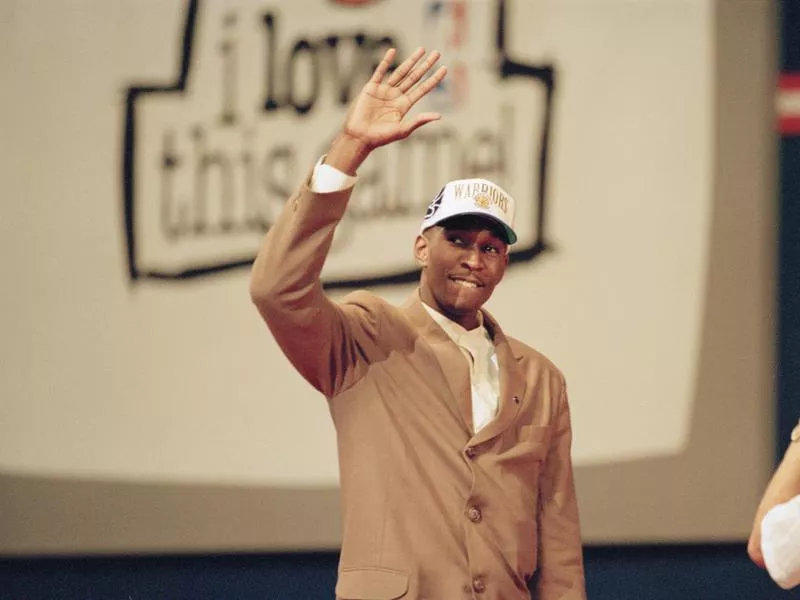
Joe Smith squandered $61 million over his 16-year career after being the No. 1 overall draft pick out of Maryland in the 1995 NBA draft. Bill Sikes / AP Photo
An ordinary name with an extraordinary career, Joe Smith was the first overall pick in 1995 and would later play for 12 NBA teams, which ties the all-time record. He never lived up to the hype of being the first pick, but stuck around long enough to play for 16 seasons and accumulate over $61 million.
But playing for so many teams is what did Smith in as he says he bought a new home every time he joined a new team.
Smith revealed he was broke in 2018, but another No. 1 pick from a different sport lent a helping hand. Former MLB star Alex Rodriguez featured Smith in his CNBC show, “Back in the Game,” which he helps former athletes get back on solid financial footing. With the help of A-Rod and a financial adviser, they devised a plan that should help Smith overcome his $157,000 debt by paying off 30 percent each year, enabling Smith to become debt-free by 2022.
#8: Darius Miles
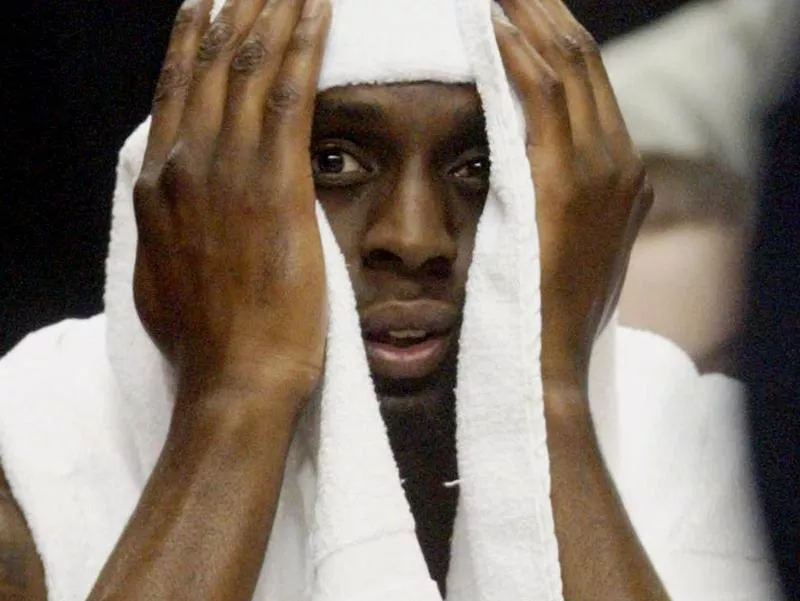
Portland Trail Blazers forward Darius Miles wonders what happened in a 2004 loss to the New Orleans Hornets at the Rose Garden in Portland, Ore. AP Photo / Rick Bowmer
Drafted straight out of high school in 2000, Darius Miles became a millionaire as a teenager. But as he got older, he still made teenage mistakes and wasted his career earnings of $62 million.
In 2016, Miles went broke and listed $460,385 in assets but $1.57 million in liabilities. He lost more than $100,000 in two failed real estate deals, including one in St. Louis with rapper Nelly and former Ram, Marshall Faulk.
To pay off creditors, Miles had to sell many of his prized possessions, including a signed Dirk Nowitzki shoe, a signed LeBron James jersey, and they even took his karaoke machine.
Miles received a total of $12,780 for selling his belongings, and while that doesn’t get him out of the red, he appears to be on the road to recovery.
#7: Kenny Anderson
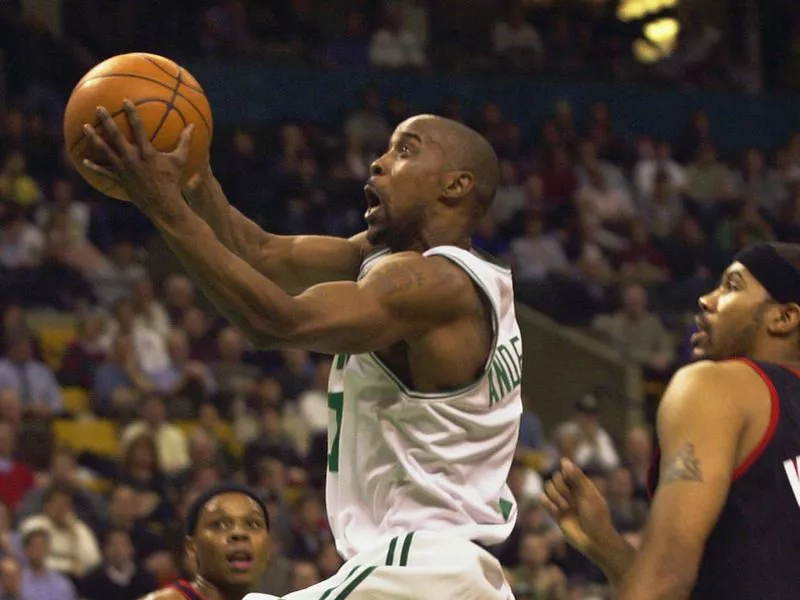
Boston Celtics point guard Kenny Anderson splits the defense of Portland Trail Blazers Bonzi Wells, left, and Rasheed Wallace, right, as he drives to the hoop during a 2002 game in Boston. Elise Amendola / AP Photo
Some consider Kenny Anderson to be the greatest New York prep player of all time, which is amazing considering who else hails from the “Mecca of Basketball.”
Anderson enjoyed a 14-year NBA career and made over $63 million in on-court earnings, but he filed for bankruptcy, literally, just weeks after his career ended in 2005.
Failed marriages did him in as one of his exes, Tami Roman, appeared on VH1’s “Basketball Wives” and proudly displayed the money she received in the divorce settlement by using the vanity license plate of “HISCASH” on her vehicle.
After Anderson lost his job as a high school basketball coach due to a DUI in 2013, he began to turn his life around. Anderson detailed many of his struggles in a feature-length documentary, “Mr. Chibbs,” which was nominated at the Miami Film Festival for best documentary in 2017.
#6: Jayson Williams
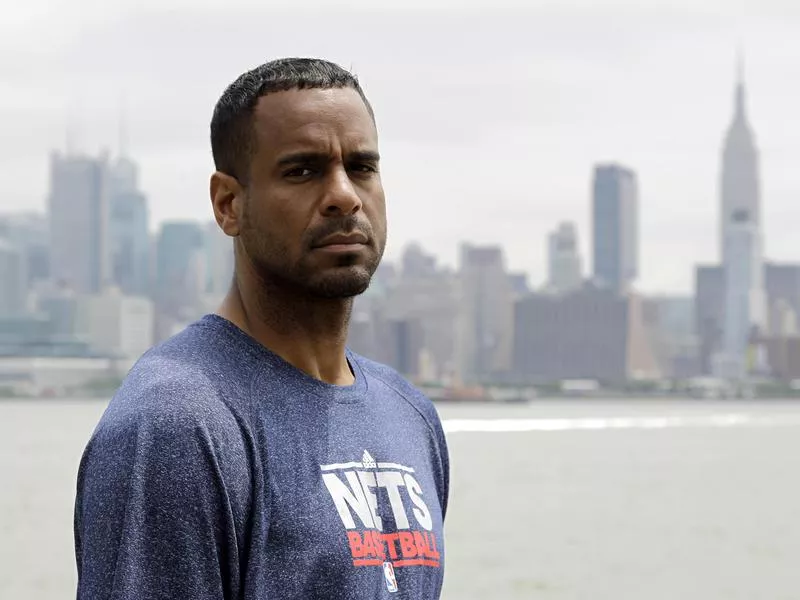
Former NBA star Jayson Williams in 2012 near the Hudson River overlooking New York City in Weehawken, N.J., after being released from prison and working to plug himself back into society. Julio Cortez / AP Photo
A late-bloomer who made his only All-Star Game at 30 and had his career end due to injury at 31, Jayson Williams could very well have been the next Charles Barkley as a TV analyst. He did work for NBC for a while but lost his job in 2002 after accidentally killing his limo driver when a gun he was playing with went off.
While it wouldn’t be until 2010 that he served his 27-month prison sentence for the fatal shooting, Williams had a string of problems before then, including multiple other arrests, drug and alcohol addictions, and going broke.
Despite his personal problems, Williams always was a generous guy and was known around New York for his $500 tips. All of that added up and contributed to his defense lawyer revealing that Williams was nearly bankrupt during his 2010 court case, despite making over $63 million.
After being released from prison in 2012, Williams turned his life around and now operates the Rebound Institute, a recovery and wellness center in South Florida.
#5: Derrick Coleman
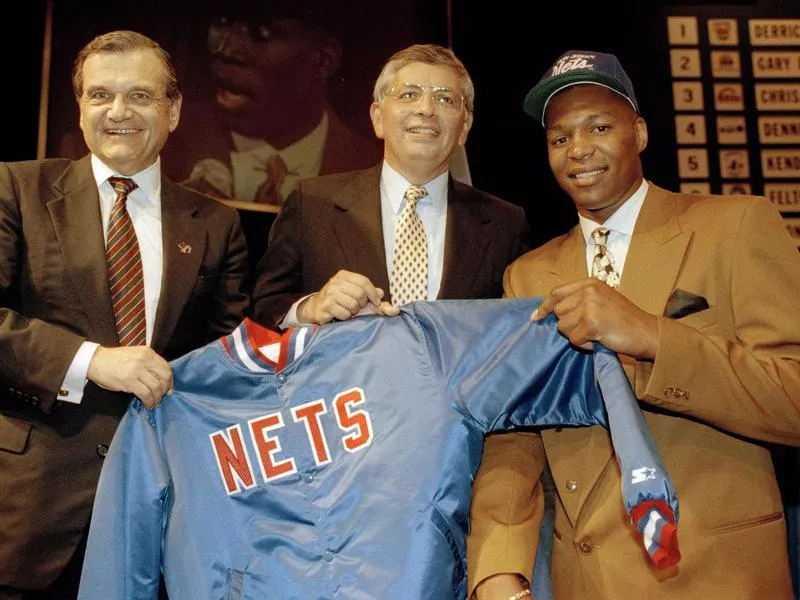
Derrick Coleman, the No. 1 pick in the 1990 NBA draft out of Syracuse, right, with New Jersey Nets owner Jerry Cohen, left, and NBA commissioner David Stern. Susan Ragan / AP Photo
The first overall pick in the 1990 NBA draft, Derrick Coleman was supposed to take the mantle of the league’s next great power forward. Charles Barkley even said he thought Coleman would be the greatest power forward ever after playing him the first time.
Coleman did win Rookie of the Year and make two All-NBA teams, but his career was a mild disappointment, considering his talent. Sports Illustrated once said of Coleman that he “played just well enough to ensure his next paycheck,” but he apparently didn’t save those paychecks as he filed for bankruptcy in 2010.
Coleman blew through $91 million in career earnings, but he has become somewhat of a success story after hitting rock bottom. He established DC Elite in his native Detroit to expose inner-city kids to the game of basketball. Coleman also remains an ambassador for his alma mater, Syracuse, and mentors kids about the importance of education.
#4: Shawn Kemp
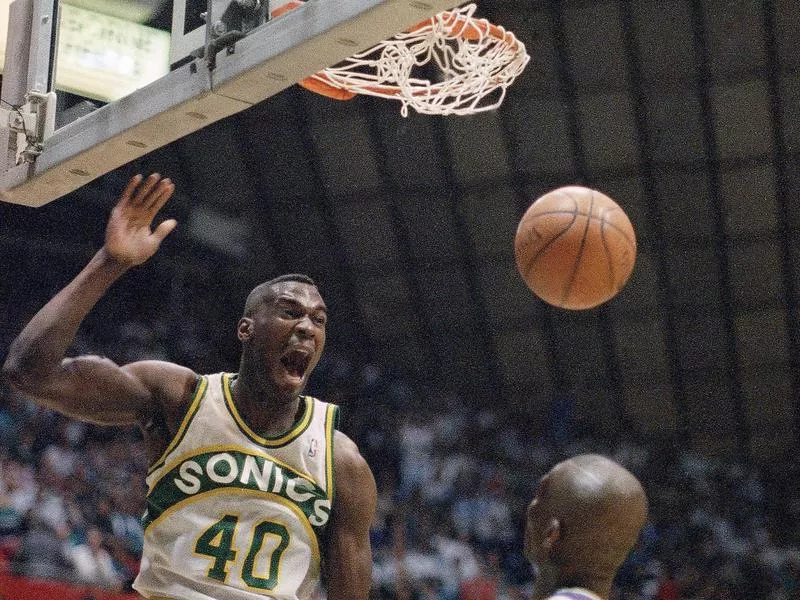
Shawn Kemp dominated with the Sonics but struggled — on and off the court — after leaving Seattle in 1997. Gary Steward / AP Photo
The “Reign Man” was one of the NBA’s most popular players during his time with the Seattle Supersonics. But after leaving Seattle in 1997, everything went downhill both on and off the court for Kemp.
He gained roughly 80 pounds during the NBA’s lockout in 1998 and went from a perennial All-Star to a bench player.
He also was arrested multiple times for drug possession and fathered (at least) seven children by (at least) six different women. Those child support payments would hurt the bank account of anyone, including someone like Kemp, who made nearly $92 million in his career.
To make a little extra money, Kemp tried to mount a comeback in 2008, five years after his last NBA game. With no NBA teams showing interest in the then-38-year-old, Kemp had to head overseas and joined Premiata Montegranaro in Italy.
#3: Vin Baker
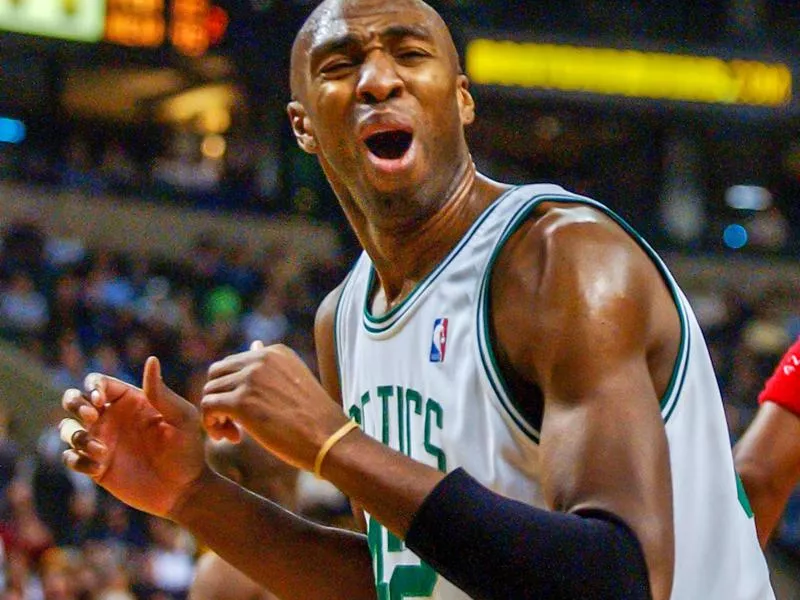
Boston Celtics center Vin Baker reacts after being charged with a foul during a 2003 game against the Chicago Bulls in Boston. Charles Krupa / AP Photo
For a man who was a four-time NBA All-Star, won a gold medal at the 2000 Olympics and made $97 million in his career, it is a startling image to see that Vin Baker had to resort to working at Starbucks to make ends meet.
Financial problems plus a battle with alcoholism is what cost Baker his fortune, but a friendship with Starbucks CEO Howard Schultz got him back on his feet. Schultz was the former owner of the Seattle Supersonics, and Baker played on the team for five seasons.
Baker reached out to Schultz for help, and Mr. Starbucks employed Baker as a manager at a location near his home in Connecticut (maybe Shawn Kemp should give Schultz a call).
With steady ground under him, Baker was able to return to his passion of basketball and worked his way up from being a high school coach to a G-League coach to a current assistant coach with the team that drafted him, the Milwaukee Bucks.
#2: Antoine Walker
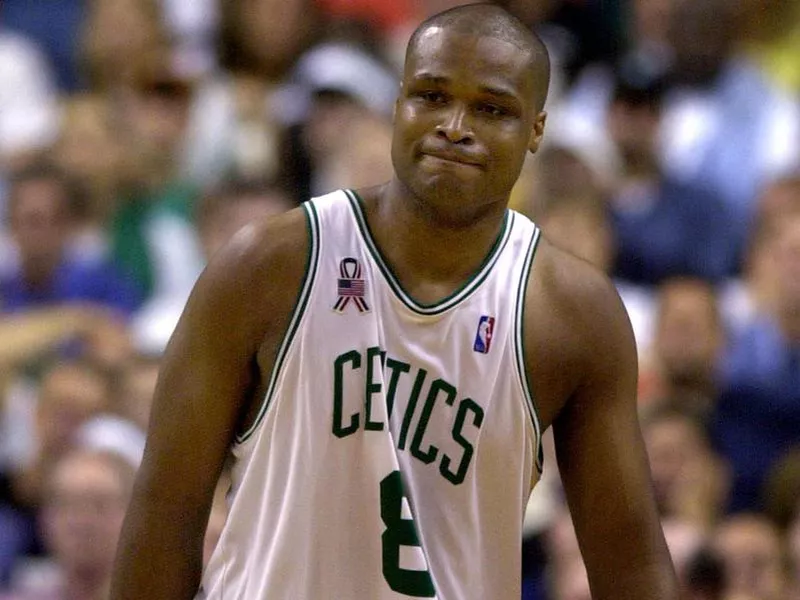
Life has been a long, strange trip for Antoine Walker. Charles Krupa / AP Photo
A Chicago native, Antoine Walker had the opportunity to play pickup basketball games with Michael Jordan while he was still a teenager. But unlike Jordan, Walker’s fortune didn’t grow after he retired from the game. It did the exact opposite.
Walker started his career with the Boston Celtics in 1996, was a three-time All-Star and won a ring with the Miami Heat, but just a year after his last game in 2008, Walker was arrested for writing bad checks related to gambling debts. He owed six figures to multiple casinos, and by 2010, Walker, who made over $108 million in the NBA, filed for bankruptcy.
A University of Kentucky teammate had to pay for Walker’s bankruptcy attorney, and the former Wildcat had to auction off his NCAA championship ring. After three years in bankruptcy, Walker declared himself as debt-free in 2013, and since then, he’s dedicated his time to sharing his story as a cautionary tale.
#1: Allen Iverson
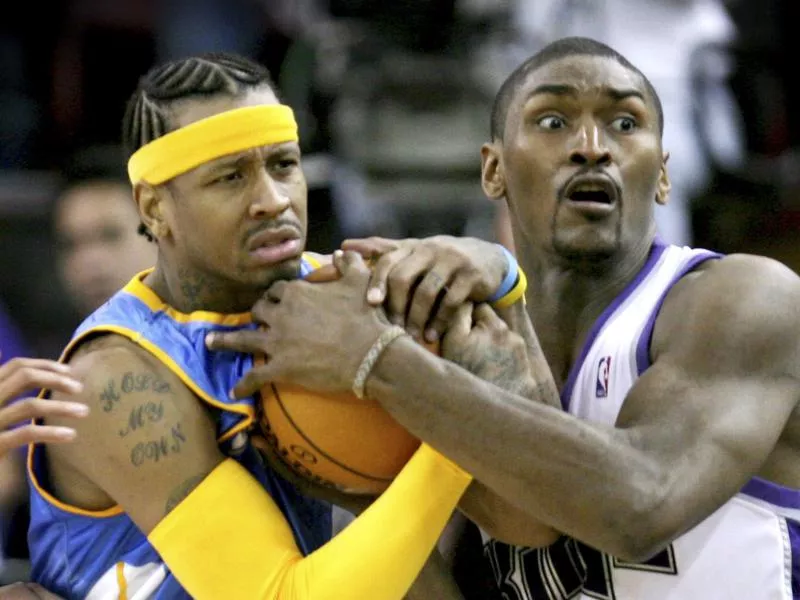
Denver Nuggets guard Allen Iverson, left, and Sacramento Kings forward Ron Artest look at an official for a call during a 2007 NBA game. Steve Yeater / AP Photo
The only former MVP and Hall of Famer on this list, Allen Iverson was one of the most iconic players of all time. While Magic and Bird saved the NBA and Jordan brought commercialism to it, Iverson’s swagger was a defining element of his popularity. He made over $154 million during his career but seemed to blow it all since he couldn’t pay back a jeweler nearly $860,000 in 2012, which forced a judge to take control of his bank account.
Iverson would later refute reports of him being broke during an interview with CBS, and it appears that he was telling the truth as the world would learn during his divorce proceedings. It was revealed that Iverson had a lifetime contract with Reebok that paid him $800,000 every year, in addition to a $32 million trust fund that is available when he turns 55 in 2030.
However, as a result of the divorce, his ex-wife gets half of the fund so Iverson will collect $16 million when he hits double-nickel.